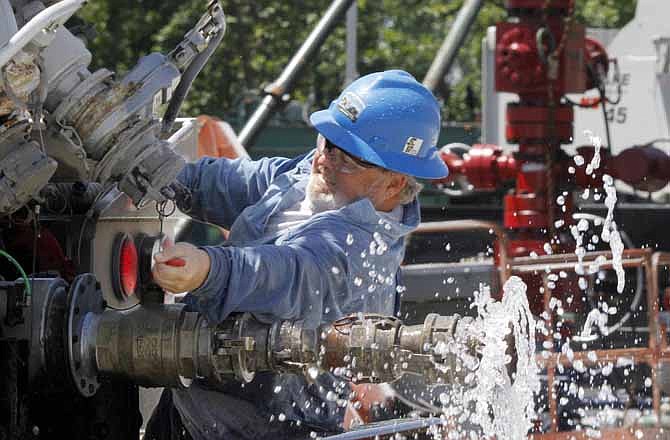Oil companies have been leasing mineral rights on thousands of acres in south-central Kansas, where they have begun drilling wells using horizontal hydraulic fracturing, or "fracking," a technique that has drawn scrutiny from the Environmental Protection Agency and other states.
Kansas State Rep. Vince Wetta, whose district is in the area, organized a recent meeting in Wellington with about 500 area residents and officials from SandRidge Energy, Chesapeake Energy and Shell Oil Co. Wetta said the flurry of leasing activity is an extension of oil drilling in neighboring Oklahoma.
"They're spending millions and millions of dollars buying up leases ... thousands of acres," said Wetta, a member of the joint legislative Interim Committee on Energy and Environmental Policy. "It's all fracking."
He said some recent leases have gone for more than $1,000 an acre where a few years ago those leases would have drawn considerably less.
The new Kansas drilling will involve fracking, which was pioneered in Kansas in the 1940s and involves pumping water, sand and chemicals into the well to open cracks and help oil and gas flow to the surface. The method has been used for decades, but has been developed over the years to such an extent that it can now be used in the Kansas formation, said Ed Cross, president of the Kansas Independent Oil and Gas Association, a trade group.
"Horizontal drilling and hydraulic fracturing technology that's now available can go into these unconventional formations," Cross said. "We've known for years about these source rocks (in Kansas) ... but they're in tight formations ... and you couldn't get to them."
As fracking increases around the country, it has drawn attention from environmental groups questioning whether the method contaminates groundwater. Oil and gas companies that use fracking have said the method is safe.
The Environmental Protection Agency said this month it found a possible link between hydraulic fracturing and groundwater pollution in a central Wyoming town. The EPA said the findings from that study, however, are specific to that town, Pavillion, Wyo. Calgary, Alberta-based Encana, which owns that Wyoming gas field, also said the compounds could have had other origins not related to gas development.
Other states also have raised concerns about fracking. Colorado regulators this month moved to require energy companies to disclose the concentrations of all chemicals they use in hydraulic fracturing. Companies in Texas will also have to begin listing their fracking fluid chemicals in February.
Kansas does not require companies to disclose the chemicals they use in hydraulic fracturing, according to the Kansas Corporation Commission, which regulates the $6 billion oil and gas industry in Kansas. KCC data also show that the state has about 5,000 intent-to-drill notices so far this year, compared with 2,800 such notices in 2009.
The number of intent-to-drill notices is also up in the south-central region. SandRidge, which filed no intent-to-drill notices in south-central Kansas in 2009, has filed 21 in the last six months alone. Shell, which also didn't file any drilling notices in south-central Kansas in 2009, filed seven in the last six months, and Chesapeake filed 10 intent-to-drill notices in the last six months in south-central Kansas, up from two in 2009.
James Roller, of Chesapeake Energy, said his company bought mineral leases to about 400,000 acres in four counties in south-central Kansas recently. He said the company has drilled three oil and gas wells using horizontal hydraulic fracturing in the area, and that Chesapeake is evaluating results from those wells. He would not say how much the company has spent on those leases.
The boost in potential drilling could be a "game changer" in Kansas, said Cross of KIOGA. But he said it's unclear how productive any drilling in the region will be and the costs of horizontal fracking, which he estimates at about $3.5 million per well, is too costly for smaller members.
"It's an unconventional play, and no one's really saying what they'd expect the reserves to be," Cross said. "This is coming up into our state, and there's a lot of apprehension, a lot of anxiety. You have to be careful about overstating stuff because there are areas of the country that it didn't pan out."
The Sierra Club has said it's concerned that the pace of development in south-central Kansas may be too much for Kansas regulators.
"Our concern is that the state doesn't have the regulations they need to deal with the kind of volume the industry is beginning to see in the state," said Yvonne Cather, chair of the Kansas chapter of the Sierra Club. "I don't believe the regulations that are current are going to address the problems that have happened in other states."

